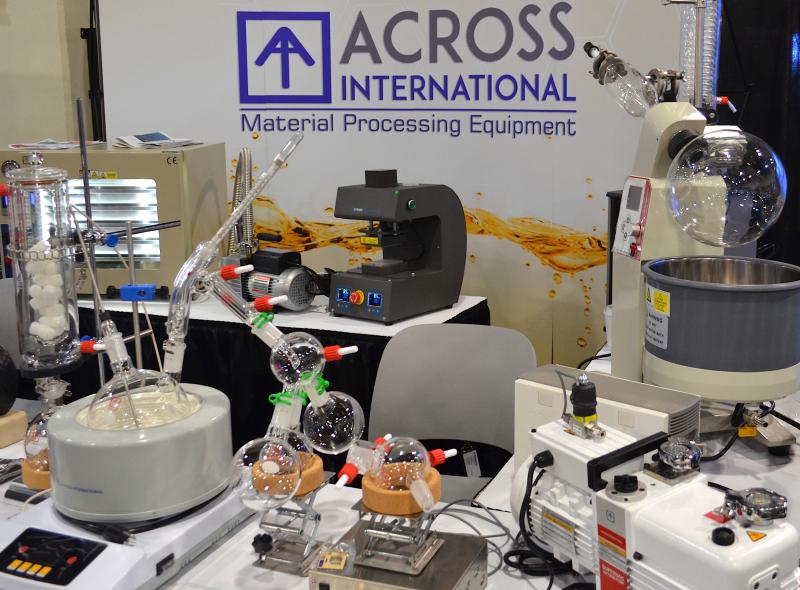California became the first state to legalize medical marijuana in 1996. Since then, 28 states and Washington, D.C., have followed suit, and eight states and Washington, D.C., have legalized recreational marijuana.
That said, marijuana is not legal at the federal level and remains classified by the Food and Drug Administration as a Schedule I drug, right up there with heroin, LSD and quaaludes.
Questions remain where the marijuana industry will be in the years to come, but a walk around the showroom floor of the 2017 Marijuana Business Conference & Expo leaves a person with the impression entrepreneurs see a growing market – one worth investing in.
From medical-testing equipment and label makers to high-end jewelry or food processors adapting their equipment, more than 200 vendors were selling their wares over the three-day conference.
Daniel Vidaurri with San Diego-based Absent Odor Proof Bags said business is booming. In California, it’s a much-needed product, he said, with a smile on his face.
Vidaurri explained that multiple layers of carbon, waterproof zippers and water-resistant fabrics ensure each bag is smell-proof. It basically just keeps the odors bouncing back and forth, he said.
He said bags can cost from $15 to $500, and they will kill odors for about two years.
Lindsay Griffo is a sales representative for the New York-based Rose Micro Solutions, a company that makes high-end optical loupes used by dentists and veterinarians. She said it was the first time the company has been at a marijuana conference.
“We’re looking to expand into new markets,” said Griffo. The glasses can be used for people who trim excess leaves off the flowers and for quality control, when growers look for mites or molds, she said.
New businesses need labels, and there were at least half-a-dozen companies who specialized in label making.
Nick Heinl of the Ohio-based Presto Labels also said the D.C. show was the first time the company has been to a marijuana conference. He said he was hoping for a little more business, but he knows the need is out there because companies frequently contact him through the website.
In addition to labels, companies need signs advertising their locations.
Colorado-based Zeon is a neon-light manufacturer that got its start in the beer industry, but expanded to marijuana-based companies after being contacted by them.
Scot Rockafellow, Zeon sales manager, said the company has done a couple hundred signs for marijuana companies. As a former Marine, he said he’s a big supporter of medical marijuana to treat post traumatic stress disorder.
The benefits are for real, he said.
Testing marijuana for purities and potency levels is a key part of the cannabis business model, and Shimadzu and Across International were two companies looking to show off their capabilities.
John Dwan, regional sales representative for the Columbia, Md.-based Shimadzu, said the company provides the hammer and nails for dispensaries testing. He said the marijuana testing market is the fastest-growing market the company is in.
Roxanne Padilla, senior sales representative for the Livingston, N.J.-based Across International, said her company has been working with cannabis testers for the past eight years. She said customers started calling them out in Colorado as the underground scene grew, but more recently there’s been growth across the country.
With the uncertainty surrounding the industry, there were also a number of attorneys making their pitch.
Florida-based attorney Greenspoon Marder has 20 offices around the country, said representative Natalie Villanueva. She said they have over 2,000 clients.
Villanueva said because of the ever-changing legal landscape, her clients need to know what’s going on. “It’s better to be safe than sorry,” she said.
SHOULD MARIJUANA BE LEGAL?
(click on graphic to enlarge)
Chris Flood has been working for the Cape Gazette since early 2014. He currently covers Rehoboth Beach and Henlopen Acres, but has also covered Dewey Beach and the state government. He covers environmental stories, business stories and random stories on subjects he finds interesting, and he also writes a column called Choppin’ Wood that runs every other week. Additionally, Flood moonlights as the company’s circulation manager, which primarily means fixing boxes that are jammed with coins during daylight hours, but sometimes means delivering papers in the middle of the night. He’s a graduate of the University of Maine and the Landing School of Boat Building & Design.


















































